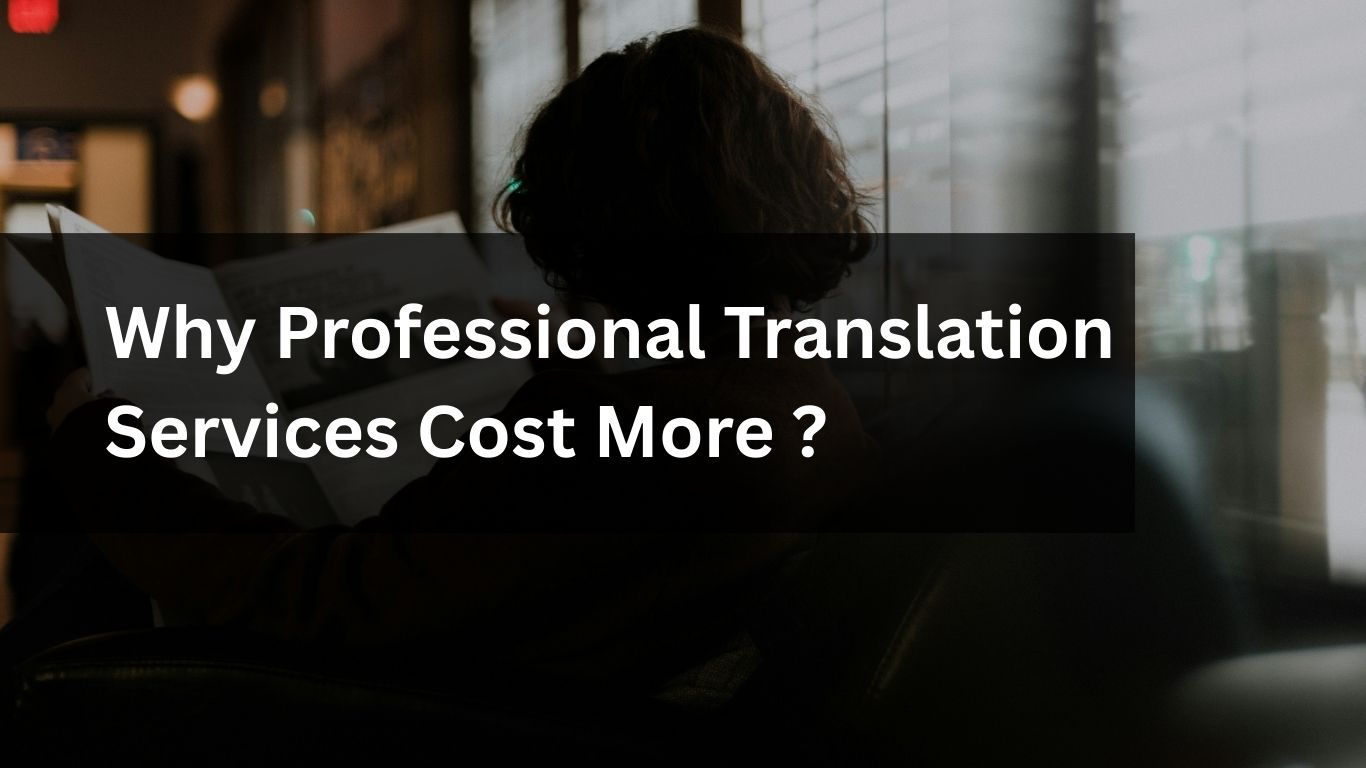In today’s digital age, machine translation tools like Google Translate and DeepL are readily accessible—many even free of charge. With such technologies at our fingertips, it’s natural to wonder: Why do professional translation services still come at a premium price? Isn’t translation just converting words from one language to another?
The truth is far more complex. Professional translation is a nuanced, specialized service that goes far beyond word-for-word substitution. It involves a combination of linguistic expertise, industry knowledge, cultural sensitivity, quality assurance, and data security—all of which contribute to the cost. Here’s a detailed breakdown of why professional translation services are worth the investment and why they often command higher rates.
1. Expertise and Specialization
Professional translators are not just bilingual individuals; they are domain experts in their respective fields. Whether it’s medical translation, legal translation, technical documentation, or marketing localization, each area demands a deep understanding of subject-specific terminologies, industry regulations, and communication standards.
For example:
-
Medical translation requires knowledge of anatomy, pharmaceuticals, and clinical terminology.
-
Legal translation must ensure precise interpretation of laws, contracts, and litigation documents.
-
Technical translation for manufacturing, IT, or engineering sectors involves complex specifications and user manuals.
This level of specialization takes years of education, training, and experience, making their services invaluable for businesses that cannot afford misinterpretations.
2. Rigorous Quality Assurance Processes
Unlike machine translations or low-cost alternatives, professional translation agencies implement multi-step quality control processes:
-
Initial translation by a domain-specialized linguist.
-
Proofreading and editing by a second expert to ensure accuracy and flow.
-
Final review using quality assurance (QA) tools to check terminology consistency, grammar, and formatting.
These stages ensure that the final output is error-free, contextually accurate, and culturally appropriate, which is critical for business communication, regulatory documents, or marketing content.

3. Cultural Sensitivity and Localization
Translation isn’t just about translating words—it’s about translating meaning. Cultural nuances, idioms, taboos, and tone all play a crucial role in how your message is received. A professional translator will:
-
Adapt humor, metaphors, and expressions that make sense in the target culture.
-
Avoid cultural faux pas or offensive language.
-
Tailor content to resonate with local audiences—a process known as localization.
This level of detail is essential in global marketing campaigns, e-commerce content, or international legal agreements, where even small missteps can damage brand reputation or customer trust.
%
CULTURALLY RELEVANT
4. Time Investment and Precision
Professional translators invest a significant amount of time in:
-
Researching terminology.
-
Cross-referencing industry standards.
-
Ensuring that tone, structure, and formatting align with the original content and target language norms.
A high-quality translation of a 1,000-word technical document can take several hours to complete properly. Rushing the process can result in miscommunication, compliance issues, or even legal disputes—all of which can be far more costly than investing in a professional translator
5. Use of Advanced Translation Technologies

While machine translation is often equated with free online tools, professional translators use enterprise-grade software like:
-
CAT Tools (Computer-Assisted Translation) for terminology consistency.
-
Translation Memory (TM) systems that improve speed and accuracy for recurring phrases.
-
Glossary management tools to ensure standardized terms across all projects.
These tools come with licensing costs and require expertise to use effectively. They are especially critical for long-term projects, technical documentation, and multilingual content management.
6. Ongoing Professional Development
Languages evolve over time. To maintain high standards, professional translators must stay updated on:
-
New industry terminologies (e.g., AI, blockchain, or GDPR in tech/legal translations).
-
Cultural trends and shifts in tone, slang, and usage.
-
Local and international regulatory changes that impact how content must be presented.
This continuous learning is a time and financial investment, and it directly affects the quality of translations—especially in regulated industries like healthcare, finance, and law.
7. Confidentiality and Data Security
When you share sensitive documents—such as business contracts, medical records, or intellectual property—with a translation agency, you’re also trusting them with confidential data.
Professional agencies implement:
-
Secure file transfer protocols (SFTP)
-
Encrypted storage solutions
-
Non-disclosure agreements (NDAs)
-
Compliance with global data protection laws like GDPR and HIPAA
This infrastructure ensures your data remains secure and confidential but requires technical resources and compliance overhead, all factored into service pricing.
8. Tailored and Custom Services

Unlike automated tools, professional translators provide bespoke solutions:
-
They adapt tone and terminology to your target audience.
-
They align content with your brand voice and goals.
-
They support style guides, glossaries, and client-specific terminology preferences.
This client-focused customization ensures every word fits your unique needs—something generic translation apps cannot deliver.
9. Professional Liability and Accountability
Reputable translation providers often offer accuracy guarantees and are liable for their work. If a translation error leads to financial loss, reputational harm, or regulatory issues, the translator or agency may be responsible for the correction or compensation.
This level of accountability and risk coverage comes with additional insurance, vetting processes, and internal audits—all contributing to higher but justified pricing.

10. Sustainable and Ethical Pricing
Fair pricing supports a sustainable industry ecosystem. By compensating professional translators ethically:
-
Agencies can attract and retain top talent.
-
Translators can invest in better tools and education.
-
Clients benefit from higher-quality results.
On the other hand, cheap translation services often exploit underpaid freelancers, cut corners, or use machine translations with little to no oversight—leading to poor outcomes and potential risks.
Conclusion
Value Over Cost
While machine translation tools have a place—especially for casual or internal use—professional translation services offer value that goes far beyond words. From domain-specific expertise and cultural fluency to confidentiality and quality assurance, professional translators ensure your message is not only understood but respected, effective, and trusted.
In a globalized business landscape, where reputation and compliance are everything, investing in professional translation is not an expense—it’s a strategic decision.
Remember: When it comes to translation, you get what you pay for. Quality, precision, and cultural relevance can never be fully automated.

